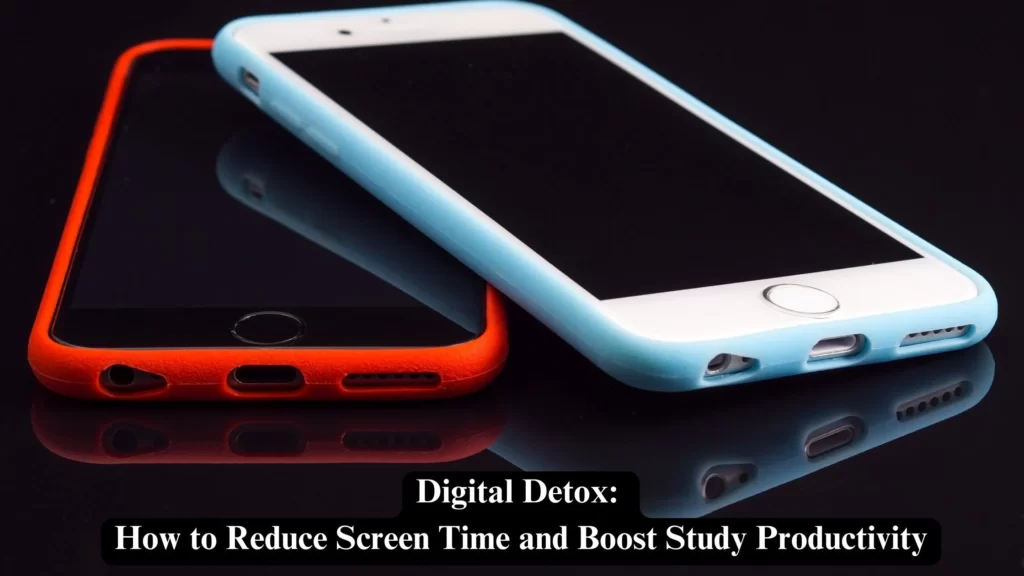
Hey there, folks! We all know how challenging it can be to stay focused during study sessions when our screens are buzzing with notifications, tempting us with endless entertainment. It’s like trying to concentrate while there’s a carnival happening right outside your window. But fear not, because in this walkthrough, we’ll delve into how you can disconnect from screens to supercharge your study sessions.
The Screen-Time-Study Connection – What’s the Deal?
Let’s talk about the connection between excessive screen time and a dip in study productivity. We’ve all been there, trying to solve math problems or read a book while our phone keeps demanding attention like a needy pet. It can feel like your brain’s on a, with no stop adventurous ride button in sight.
The reality is, that too much screen time can seriously mess with your ability to concentrate and absorb information. You may find it harder to stay focused, your memory might not be as sharp, and your overall academic performance can take a hit. In simpler terms, it’s like trying to hold a conversation in a crowded room with a hundred conversations happening at the same time – not very effective, right?
Signs You Need a Break – Are You Overdoing It?
Let’s keep it real – we’ve all fallen into the screen-time trap. If you find yourself constantly checking your phone, watching cat videos on YouTube, or endlessly scrolling through social media during your study time, it’s a clear sign that you might need a break from screens.
If your phone has become a permanent fixture in your hand, and you can’t even take a bathroom break without scrolling through your Instagram feed, it’s time to pause
and reevaluate. Screen addiction isn’t a joke, and it can have a massive impact on your academic success. When your study sessions start to resemble a Netflix binge-watching marathon, it’s time to reconsider your screen habits.
Practical Steps – How to Cut Down on Screen Time?
Now that we’ve acknowledged the problem, let’s talk about solutions. We’re not going to propose any magic tricks, but we do have some simple tips that can help you take control of your screen time and, by extension, your study sessions.
Set Time Limits:
Think of your screen time as a budget. You wouldn’t blow all your money on the first day of a vacation, right? Apply the same principle to your daily screen time. Set a limit for how much time you’re going to spend on your devices and stick to it.
Turn Off Notifications:
Those incessant dings and beeps are like a mischievous imp, always diverting your attention. Disable non-essential notifications, so you’re not constantly pulled away from your studies.
Create a Distraction-Free Study Environment:
Picture this: you’re at the library, and the person at the next table is watching funny cat videos on their laptop. You can’t help but glance over and get sucked in. To avoid this, create a study space that’s free from temptations. That means no TVs, no game consoles, and no noisy roommates if you can help it.
Plan Screen-Free Breaks:
Taking a break during your study session is essential, but those breaks don’t need to involve screens. Go for a walk, chat with a friend, or simply relax with a good book. This helps you recharge without getting lost in the digital abyss.
Use Screen Time Monitoring Apps:
The irony isn’t lost on us – we’re suggesting using an app to limit your app usage. There are several apps available that can help you track and manage your screen time. They can provide insights into your usage patterns and offer reminders to take a break when needed.
Boosting Study Gains – The Benefits of a Screen-Time Detox
Now that you’ve armed yourself with strategies to cut down on screen time, let’s discuss the exciting part – the benefits of your efforts.
When you successfully unplug from screens during your study sessions, you’ll find it easier to concentrate. Your brain will thank you by working at its optimal capacity, absorbing knowledge like a sponge. It’s like clearing the fog from your glasses and seeing everything more clearly.
Memory retention gets a significant boost too. When you’re not constantly interrupting your studies to check your phone or jump on social media, your brain can form strong connections with the information you’re trying to learn. Think of it like having a better filing system in your brain – you can retrieve information faster when you need it.
With increased focus and improved memory, you’ll perform better academically. It’s like having a superpower – you’ll be more efficient and get more done in less time. So, disconnecting from screens is like giving your academic performance a turbocharge. The Final Verdict! In conclusion, disconnecting from screens might seem like a small change, but it can have a significant impact on your study productivity and overall academic
performance. It’s like swapping your old, rusty bicycle for a shiny new one – the ride is smoother, and you’ll reach your destination faster.
Are you ready to give it a shot? It’s time to take control of your screen time, boost your study productivity, and make your learning experience a whole lot better. The digital detox horizon awaits. So, chart your course and set sail toward academic success. Your journey to maximum study gains begins now!
